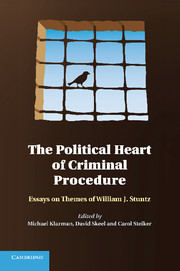Book contents
- Frontmatter
- Contents
- Contributor List
- Introduction: Appreciating Bill Stuntz
- Part I The Political Economy of Substantive Criminal Law
- Part II Police Investigations
- 5 The Accidental Feminist
- 6 The Distribution of Dignity and the Fourth Amendment
- 7 Why Courts Should Not Quantify Probable Cause
- 8 DNA and the Fifth Amendment
- Part III Emotion, Discretion, and the Judicial Role
- Index
- References
5 - The Accidental Feminist
Published online by Cambridge University Press: 05 March 2012
- Frontmatter
- Contents
- Contributor List
- Introduction: Appreciating Bill Stuntz
- Part I The Political Economy of Substantive Criminal Law
- Part II Police Investigations
- 5 The Accidental Feminist
- 6 The Distribution of Dignity and the Fourth Amendment
- 7 Why Courts Should Not Quantify Probable Cause
- 8 DNA and the Fifth Amendment
- Part III Emotion, Discretion, and the Judicial Role
- Index
- References
Summary
It is impossible to capture in a few (or even many) words the magnitude of Bill Stuntz's influence on the mainstream scholarly literature on criminal procedure and criminal law. To be sure, the inventory of his books, papers, and essays does offer some insight into the breadth and depth of his individual contributions. Bill has coauthored textbooks on criminal procedure, federal criminal law, and substantive crime definitions. Among his too-numerous-to-count scholarly publications are articles about topics ranging from the substantive origins of criminal procedure, the perverse effects of the exclusionary rule, the distribution of Fourth Amendment privacy, the value and function of the Fifth Amendment privilege against self-incrimination, the pathological politics of criminal law, race and racism in the criminal justice system and especially in the war on drugs, local policing in the wake of the 9/11 terrorist attacks, plea bargaining, habeas corpus, gambling, and beyond. Even this monumental bibliography does not do full justice to the power of Bill's achievements, because it does not reveal the extent to which his insights have fundamentally reshaped the work done by a whole generation of criminal justice scholars. Nor does the bibliography disclose how profoundly Bill's contributions have influenced and motivated the work of still other authors, including those who, like me, tend to employ methodologies and pursue political objectives that often are quite different from his own.
For me, one of Bill's most powerful and liberating intellectual moves was his injunction to cease thinking about substantive criminal law and criminal procedure as operating within separate practical domains or as occupying separate curricular and scholarly spheres. Rather, as Bill instructed, criminal justice must be studied as a system in which outcomes are determined by the constant interplay of, or by the sometimes fractious and sometimes friendly relations between, these two ostensibly distinct bodies of law. One measure of the genius of Bill's insight is that it now seems to us to be obvious – so obvious that it goes without saying, let alone citing to any particular Stuntzian article – that we may make sense of the work performed by substantive criminal prohibitions on the one hand and by criminal procedure on the other, only if we take account of the work that they do together.
- Type
- Chapter
- Information
- The Political Heart of Criminal ProcedureEssays on Themes of William J. Stuntz, pp. 111 - 122Publisher: Cambridge University PressPrint publication year: 2011

